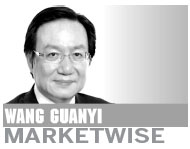Soaring inflation fuels yuan appreciation talk
Updated: 2010-12-15 08:16
By Wang Guanyi(HK Edition)
|
|||||||
The ripple effects of QE2 include exporting inflationary pressure to emerging markets including China. The increase in money supply around the globe is devaluing currencies, which in turn will spike up the value of precious metals and commodities as "alternative currencies".
With the CPI in China now above 5 percent, renewed concerns over record high prices for commodities and goods at home have spurred talk about further yuan appreciation in order to ease imported cost pressures.
To keep CPI at bay, China is also expected to tighten its monetary policy further to combat rising inflation.
According to estimates compiled by Bloomberg and Morgan Stanley, China's M2 growth target and quota for new bank lending for 2011 will likely be set at 15 percent and 7 trillion yuan, respectively, down from 17 percent and 7.5 trillion yuan in 2010.

Apart from stronger expectations of monetary tightening in China, uncertainties are looming over investors ranging from rising unemployment in the US and the Euro-zone to tensions in the Koreas. Against this backdrop, however, markets have remained resilient as global indices make modest gains.
Against these unfavorable fundamentals which may continue throughout 2011, capital continues to flow into equity markets and is spilling over to other asset classes as well.
The outlook for the US economy remains mixed as well. The unemployment rate remains stubbornly high after recent non-farm payroll numbers and the bleak housing picture continues after last week's CaseShiller home price index showed disappointing results. However, new home sales and construction spending grew a surprising 10.4 percent and 0.7 percent month-on-month respectively.
Looking at the corporate level, profitability returned as earnings were upbeat. On the back of this, corporate CDS (credit default swap) spreads narrowed and high yield bonds have come back in favor as investors seeking higher returns are regaining confidence in the global economy. As a result, the cost of protection has come down, as people view defaults as unlikely as CDS indices across the globe are lower. Markit CDX North America Investment Grade Index fell 3.4 basis points, Markit iTraxx Europe Index dropped 6.6 basis points and Markit iTraxx Asia Index dropped four points.
Despite AAA-rating US dollar-denominated assets being favorable investments for China's currency reserves, 10-year treasury yields have risen to approximately 3 percent, its highest level since July. This convergence of yields indicates that despite disappointing economic numbers and events that are causing concern, capital is returning to other sectors such as corporate bonds and equities. US Federal Reserve Chairman Ben Bernanke stated on November 30 that the economy is "not growing fast enough to materially reduce the unemployment rate" and the rate is "about the same as it was when the recession officially ended." With unemployment towering at high levels, it may again drive the case for further quantitative easing.
While many emerging market currencies are likely to continue strengthening versus the US dollar - despite recent measures to contain currency appreciation (including central bank intervention, capital controls and more muted policy tightening) - the US dollar should remain strong with US dollar maintaining its status as the global settlement and reserve currency.
The main concerns are in Europe's situation and more specifically, the so-called PIGS - Portugal, Ireland, Greece, and Spain. The European bond markets have experienced sell-offs forcing Greece and Ireland to seek aid from the IMF and other EU nations. Many believe Portugal is next in line and if their government bond yields are any indication, its 10-year treasuries are yielding more than 7 percent.
Under pressure to take charge of the spreading sovereign debt crisis, European Central Bank (ECB) President Jean-Claude Trichet said it will keep offering banks as much cash as they want through the first quarter of 2011 over periods of up to three months at a fixed interest rate. Subsequently, ECB initiated a new wave of purchases, triggering a surge in Irish and Portuguese bonds and triggering inflationary concerns in the region.
The author is a visiting professor at the Asian International Open University, an international financial commentator at NOW business news channel and founder of www.wongsir.com.hk.
(HK Edition 12/15/2010 page2)